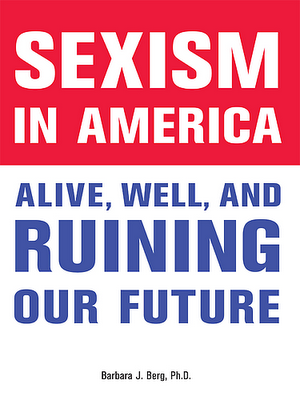 |
| Visit Barbara J. Berg’s Web site for more information. |
Yesterday, I wrote a piece analyzing two misogyny-filled reviews of I Don’t Know How She Does It. The process got me thinking quite a bit about the ways in which reputable movie critics choose to evaluate films, particularly woman-centered films. Most critics loved Bridesmaids, but that isn’t remotely shocking if you read Bridesmaids as another Apatow-branded gross-out fest that just happened to star women. Personally, I believe that reading shortchanges the film, but I also believe the undercurrent of all too familiar man-child humor helped Bridesmaids not only stake its claim at the top of the box office, but also transcend the dreaded “chick flick” label. Other movies showcasing women rarely get that kind of respect from critics, perhaps because they lack that Apatowian guy-cred, or perhaps because they’re generally just not taken seriously.
Sexism in America: Alive, Well, and Ruining Our Future by Barbara J. Berg, Ph.D., was published in 2009, pre-Bridesmaids sensation. In chapter 19, “Missing at the Multiplex,” Berg discusses, well, what we discuss at Bitch Flicks: the objectification, silencing, and absence of women and girls in film and television. Her astute observations about the reaction by male critics (and men in general) to the release of Sex and the City: The Movie deserves a spotlight here–because it encapsulates a larger trend I see among male film critics to rake these woman-centered films over the fucking coals. Make no mistake, SATC was a shitty movie. Amber and I reviewed it, and we both agreed it was terribly shitty. But men have a strong tendency to approach many films about women–and I’m talking about movies that don’t qualify for that coveted injection of Apatow-sponsored Guy Approval (like the one Bridesmaids got)–with a disdain so palpable one can’t help but go, “What the fuck, man?”
Which brings me to our Quote of the Day.
The one notable exception to the hailing males of Hollywood is the movie Sex and the City (SATC), a smash hit racking up fifty-seven million dollars on its opening weekend. Just about every reviewer mentioned the gal pals responsible for this spectacular success, just as they made much of male absence (except for gay men, who are presumably big fans).
Of course, there’s the old adage in Tinsel Town that women will see a “male” movie, but not vice versa. Still, the way men dissed SATC (most without having seen it) hints at something deeper going on. Perfectly wonderful men shuddered in horror at the very mention of the movie. They seemed absolutely phobic, as though watching a movie about four devoted friends who together wielded power and authority was an affront to their manhood.
“In an Internet Movie Database poll, 7,197 men voted to give SATC an average score of 3.8–that puts it among the worst movies of the year,” reported Ramin Setoodeh in Newsweek (June 16, 2008). Male reviewers were particularly nasty. Anthony Lane wrote in The New Yorker that the movie “was more like a TV show on steroids. . . . All the film lacks is a subtitle, ‘The Lying, the Bitch and the Wardrobe.’ David Poland at Hot Button said, “The only genuinely emotional moment I experienced in this film came to pass in a moment where the characters actually shut up for a moment.”
SATC is the first movie in a long time to reverse the formula and put women, not men, at center stage. Is it a big surprise that many males immediately called for them to be silenced? Maybe they’re just pissed that SATC scored more at the box office than their favorite “dick flick,” Indiana Jones.
Thoughts?

I never rate things on IMDB as it’s weighted towards male reviewers so their scores are worth more. I actually created a male account on there once intending to rate loads of feminist films at 10 but then realised that it didn’t actuallly solve the problem; what women enjoy just isn’t seen as valuable, intelligent or meaningful.
I haven’t paid much attention to IMDB, at least as far as movie ratings go. But I’m starting to get the impression it’s a little like reading through YouTube comments, which are openly sexist and derogatory toward women.